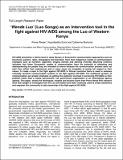| dc.contributor.author | Peres Wenje, Nyambedha Erick, Catherine Muhoma | |
| dc.date.accessioned | 2020-11-30T06:48:37Z | |
| dc.date.available | 2020-11-30T06:48:37Z | |
| dc.date.issued | 2011 | |
| dc.identifier.uri | https://repository.maseno.ac.ke/handle/123456789/3035 | |
| dc.description.abstract | HIV/AIDS prevention in Africa tend to value literacy or Eurocentric communication approaches such as brochures, posters, radio, newspapers and television more than indigenous modes of communication strategies such as narration (sigendni), singing (wende) and dancing (miende). Mounting evidence indicates that these Eurocentric modes of communication have the potential of alienating and disempowering the people they are intended to inform because the communication process does not start from within their experiences and in many cases are incapable of giving full respect to their values. To make a mark in the fight against HIV/AIDS in African countries there is need to embrace culturally sensitive communication systems in the fight against HIV/AIDS. The traditional systems of communication put greater emphasis on getting the audience involved in perceiving HIV/AIDS as their problem rather than a media, government, non government organization or an international agency agenda. This paper, shares the techniques, insights and lessons learnt from Peres Wenje PhD research work that sought to investigate how the Luo ora-media have been creatively used to create awareness and empower the community to take ownership of the fight against HIV/AIDS. | en_US |
| dc.publisher | Academic Journals | en_US |
| dc.subject | HIV/AIDS prevention, culture, mass media and ora-media. | en_US |
| dc.title | Wende Luo (Luo Songs) as an intervention tool in the fight against HIV/AIDS among the Luo of Western Kenya | en_US |

